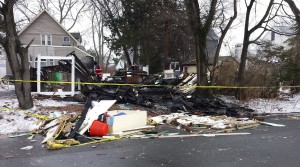 In response to recent gas explosions that leveled a pair of New Jersey homes, Senator Jim Holzapfel and Assemblymen Dave Wolfe and Greg McGuckin of the 10th Legislative District have drafted legislation requiring explosive gas detectors to be installed in homes and other dwellings.
In response to recent gas explosions that leveled a pair of New Jersey homes, Senator Jim Holzapfel and Assemblymen Dave Wolfe and Greg McGuckin of the 10th Legislative District have drafted legislation requiring explosive gas detectors to be installed in homes and other dwellings.
Explosive gas detectors alert residents to the presence of dangerous quantities of methane or propane gas in the air. Methane is the primary component of natural gas used to fuel many furnaces, hot water heaters, fireplaces, stoves and ovens.
“While the use of natural gas and propane for heating and cooking in our homes is extremely safe, the recent house explosions in Pt. Pleasant Beach and Stafford Township have reminded us that gas leaks do pose some risk,” said Holzapfel. “We can lower the risk of gas leaks by modeling our response on the successful rollout of carbon monoxide detectors that are now present in nearly every home.”
An unoccupied home in Stafford Township exploded on February 24 due to a leak from a natural gas main into the home’s basement. Less than a week later, on March 2, a gas leak caused a home in Point Pleasant Beach to explode, severely burning the occupant. In both instances, the homes were completely destroyed.
Under the proposed legislation, the new requirement for the use of explosive gas detectors largely would mirror similar existing requirements for carbon monoxide detectors. The legislation allows for the use of a single device that can detect both carbon monoxide and explosive gases to satisfy both requirements.
Combination units that detect both carbon monoxide and explosive gases can be purchased for as little as $40.
“Affordable explosive gas sensors are now widely available at most home improvement stores,” said Wolfe. “We’d like to see them in every home alongside smoke and carbon monoxide detectors.”
The legislation requires one and two family homes to be inspected for the presence of an explosive gas sensor prior to the issuance of a certificate of occupancy. There would be no need to install a gas detector if it has been determined that no potential explosive gas risk exists.
Similarly, every unit in a hotel or multiple dwelling would be required to have explosive gas detectors installed.
“The cost of installing explosive gas detectors is negligible, but the benefit is substantial,” added McGuckin. “Their widespread use will help to warn residents and allow for gas leaks to be fixed before people are hurt and property damaged.”
[TLS]

Doesn’t a carbon monoxide detector detect gas? A carbon monoxide detector wouldn’t alarm before a gas explosion?
@ eli no it only detects carbon monoxide not natural gas hence the name. they have two completely different chemical makeups (CO vs CH4)
Typically you smell gas way before there is a problem and if your not home fot weeks this detector wont help you. Gas explosions are very rare and they don’t need to take political advantage of every tragedy.
@ J.O.A.T so why do CO detectors go off on yom tov when ovens are on for a long time?